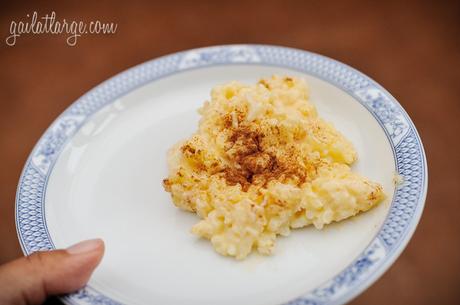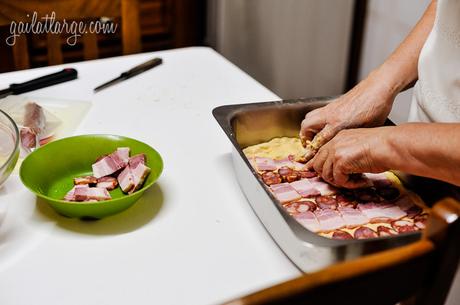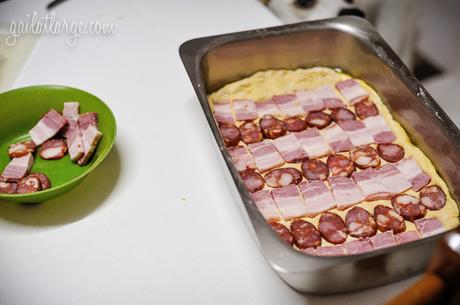
arroz doce @ Mother-in-Law Restaurante
Today’s big family food-fest (with cousins) included my mother-in-law’s bola de carne (“meat cake”) which I’ve chronicled before, and arroz doce (“sweet rice”), although I didn’t photograph the whole process of how she makes it. Arroz doce follows the same general recipe as English-style rice pudding, but without vanilla extract. Portuguese native rice is also a little different; using a short round grain called Carolino, it will vary the arroz doce somewhat in texture and affect cooking time if made from a different type of rice.
After some searching online for an arroz doce recipe to feature, this one stood out for me because it references the author’s childhood in Pico, the Azores:
http://photosandfood.ca/2015/05/03/portuguese-rice-pudding-arroz-doce/
(Interestingly, every time I do a search for Portuguese recipes online, the majority of them are from the Portuguese diaspora communities on the U.S. Eastern seaboard or around Toronto. I know the Portuguese have settled elsewhere in the world, but either those search results tend to get buried or the ones above are the loudest choruses of diaspora voices online.)
A little addendum to today’s arroz doce: my mother-in-law also sometimes makes a version without milk for my father-in-law, because he grew up in Africa and didn’t develop a taste for dairy. (More than 40 years have passed since the Revolution when his family were forced to flee Africa and return to Europe, but he still favours the burn of piri-piri and avoids most dairy products.) I have tried the milk-less version of arroz doce and it’s not bad. If you’re lactose intolerant, you could try substituting the milk for soy milk, rice milk, or almond milk. I also found horchata on Friday for the first time since I tried it in Spain in 2004, and its sweetness suggests it may work in arroz doce, too, though as of yet untested.
On a final note, I should mention that rice dishes are a major part of Portuguese cuisine — Portugal is the largest consumer of rice in Europe, by a long shot. It brought on a peculiar realization: I have never felt more Filipino in my life than here in Portugal, because of all the rice! It’s not something I noticed until I moved; wherever I’ve lived before as an adult, rice was imported and thus I’ve always viewed it as a foreign product.
I’ve since learned that Portugal has been a rice producer for hundreds of years. Andrea Smith of Catavino wrote an article in 2014 about the history of rice in Portugal and the current state of the domestic rice industry. According to her article, there is a national campaign this year aimed at raising the profile of locally grown rice and promoting the benefits of using the native variety of Carolino in Portuguese cuisine. Whether that campaign becomes successful or not remains in the hands of the consumers, but as a buyer for Casa Aguiar, I’m all for sourcing food locally.
And now, that bola de carne…

bola de carne @ Mother-in-Law Restaurante

bola de carne @ Mother-in-Law Restaurante
October 4, 2015
Album: Portugal [Autumn 2015]
Possibly related posts:
- Family Sunday, aka Day of Eating Sunday lunch with the extended Portuguese family is really a euphemism for “we’re going to eat all day and there’ll still be leftovers sent home with you”. After several helpings...
- Traditional Portuguese Kitchen: How To Make Marmelada Although it sounds like the English word marmalade, it is quite dissimilar in texture, since quince is not citrus and the paste is smoother (no peels go in), cooling to...
- Just Another Day In Confusion-Land This is peru, not to be confused with Peru the country. Peru is turkey, not to be confused with Turkey the country. Confusos? Confusas? Let’s just eat....
- Bacalhau Com Broa Behold, another creation from Mother-in-Law Restaurante: codfish with cornbread. The Portuguese are very fond of their bacalhau, which is curious because cod is not native to Portugal at all —...
- Traditional Portuguese Kitchen: How To Make Bola De Carne This is the second installment of a photo series featuring the inner workings of a typical Portuguese kitchen. Recipes can be found all over the internet but what I am...

